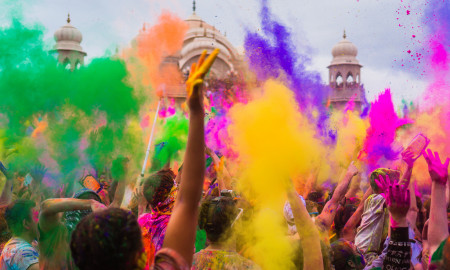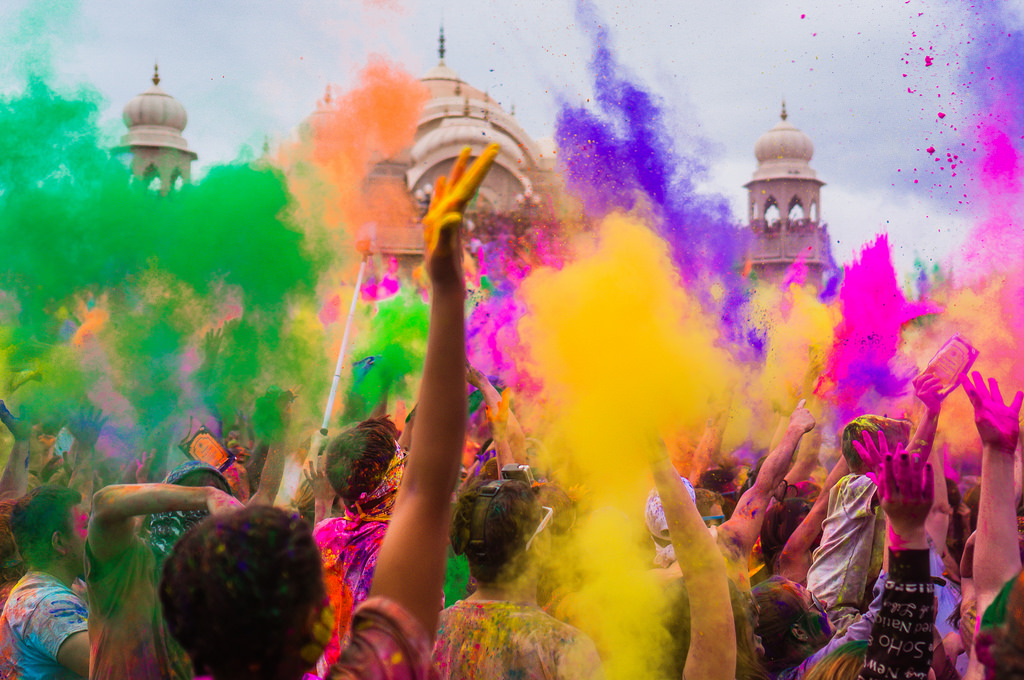
Costumes! Color! Food! Bonfires! Storytelling! Water Fights! 2016 is the best year ever because of the exact intersection of Purim and Holi.
Two groups of victims of the American myth of the “model minority,” Jews and South Asians, both get to let loose on festivals that are, well, festive. This year, both celebrations begin tonight, with the Purim Megillah reading, and with Holika Dahan, a bonfire the night before Holi proper.
Holi is an originally Hindu celebration celebrated by diverse groups in India and Nepal, as well as expatriate communities. While it’s diverse in observance worldwide, its origins involve celebrating the harvest, worship of Krishna, and a story about a demon named Holika who dies to save her nephew, symbolizing the victory of good over evil.
Holi celebrations are perhaps most famous outside of Asia as a “color carnival.” Celebrants throw color dyes as powder, and then use water guns and balloons to activate the dyes.
While it’s often a forced exercise to compare two completely different religious traditions, Holi and Purim both are absolutely joyous, even as holidays go (and in some places, Holi is also a holiday of love). Sure, Holi and Purim both involve music and delicious treats (like the best holidays), but what’s more, they both involve upsetting social order in the name of, simply, fun!
Purim is a chance for Jews to leave their expected roles behind. Orthodox men, for example, may cross-dress, and the status quo is, if briefly, in disarray. In Holi, everyone is equally invited to celebrate, or become a target in a water fight, regardless of age, class, gender, caste, you name it.
(Another commonality is intoxication; Purim is an alcohol-imbued holiday, and Holi is often celebrated with bhang, an edible cannabis.)
So happy Purim if you’re Jewish, Holi if you’re Indian, and both if you’re both!
If you’re not Jewish, Indian, and/or Nepalese, don’t feel left out. March 24th is National Chocolate-Covered Raisin Day.
Image credit: Steven Gerner via flickr.









Kuzey Güney’e Abone Olmak için Güney iki kardeşin hayatta var olabilmek için verdikleri
zorlu mücadelenin ı ayrı.
İngiltere’de reçete için birkaç kas gevşetici mevcut.
İçerirler: Baklofen. Dantrolen. Diazepam.
Tizanidin. Methocarbamol. Dronabinol ve kannabidiol içeren bir esrar özü (ticari adı Sativex®).
Kas gevşetici preparatlarının çoğu tablet, kapsül veya sıvı olarak mevcuttur.
I am often to blogging and i truly appreciate your content. The write-up has actually peaks my interest. I am going to bookmark your website and maintain checking for new data.